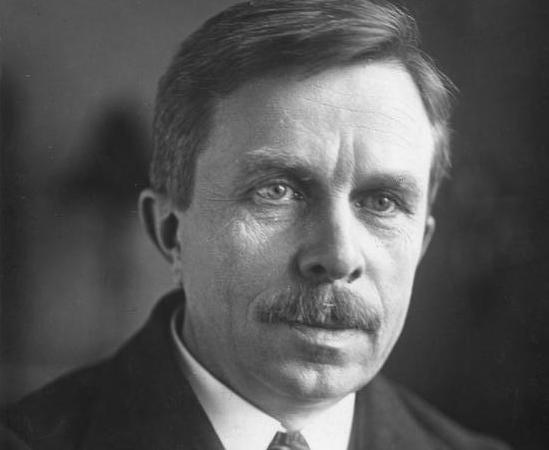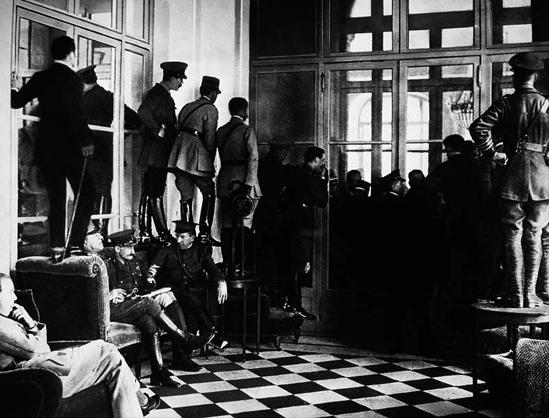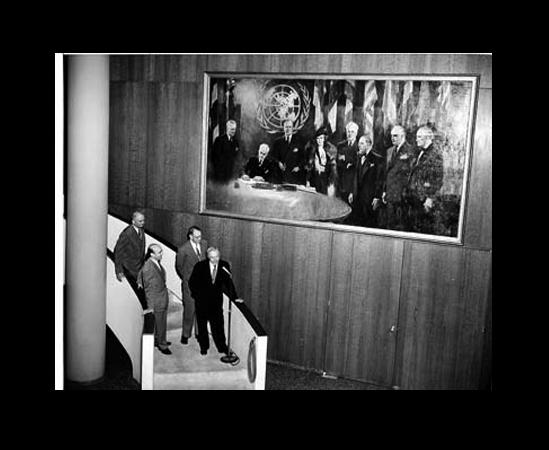In the Hall of Mirrors at Versailles, a small, dapper, mustachioed man stood “close to the front and over by the wall” for the signing of the Treaty of Paris in 1919 and “saw everything close at hand.” The historian of the American delegation and author of the provisions establishing the International Labor Organization, he had been intimately involved in the negotiations that ended the Great War and created the League of Nations; he certainly deserved a good view of the ceremonies. In 1945, at the San Francisco Conference that established the United Nations, the same man, now portly and his trademark mustache completely white, chaired the semiofficial American group “chiefly responsible,” he wrote, “for the economic and social provisions of the charter.” Although pneumonia cut short his stay in San Francisco, he later wrote that he had “never had a more inspiring experience” than in this effort to “weld the aspirations to peace into a worldwide organization.”
James T. Shotwell, Bryce Professor of the History of International Relations at Columbia University, devoted most of his life, as he put it, “to the organization of peace.” Considering the period his life spanned — he died at 90 in 1965, having studied and taught at Columbia for nearly 50 years — this was no small project. He was present at, indeed instrumental in, the creation of some of the most important international institutions of the twentieth century. He believed that his was the beginning of a new era, a time in which rapid technological advances demanded new conceptions of how states resolved their differences. Both in his scholarship and in his constant, restless button-holing of the rich and powerful around the world, he argued that in the modern world peace is not merely the absence of war but something that needs to be planned and organized. He did all he could to encourage that organization, and in doing so he helped provoke an entirely new academic field — international relations — and proposed many of the policies and instruments by which governments today approach management of their common affairs.
Born in Ontario to American Quakers, Shotwell received a BA from the University of Toronto in 1898 before coming to New York to study under Columbia historian James Harvey Robinson. At Columbia he encountered a lively intellectual community, seized with debates about the “New History.” He quickly adopted his adviser’s view that the increasingly influential “scientific” methods of studying society might be applied to the practice of history and he applied them in his dissertation in medieval history, “A Study of the History of the Eucharist.” He would later observe that although he took “a semester on the history of international law, by the distinguished jurist John Basset Moore, later a judge on the World Court, . . . this was the only course that had any bearing on international relations in the faculty of Political Science, a subject . . . on which most of my later life was spent.” Nonetheless, he seems to have been quite content in the department and by 1903 he had been appointed an instructor. As he recalled:
Next to Robinson, my closest friend in Columbia was Charles Beard . . .
Our offices were close together — Robinson’s, Beard’s and mine. At the end of the day, we generally got together and talked over the state of the world and of our souls, and were very frank about both. Beard was a lovely spirit — one of the most likeable men I have ever known . . . Beard and I later differed very much in outlook. He became an isolationist and I went into the field of international relations. Our differences were never minimized in our talks with each other. I am happy to say, though, that they never created a moment’s difference in our personal feeling toward each other.
Reflecting the still-powerful influence of European intellectual life in American universities at the end of the nineteenth century, Robinson told Shotwell that if he wanted a permanent position at Columbia, he should spend some time in Europe. This he did, spending more than a year visiting a variety of universities on the Continent and improving his fluency in several European languages. To subsidize his journey, he contracted to write articles and soon became the managing editor of the enormously influential 11th edition of the Encyclopædia Britannica. This not only provided a handsome salary and honed his organizational skills but afforded him the company, or at least the acquaintance, of some of the best-known figures of the day, from Bertrand Russell to Henry Ford, both of whom were contributors. Shotwell himself wrote nearly 250 articles — including the article on “History” — and commissioned hundreds more, capturing the publishers’ intention to make the Encyclopaedia “a real mirror of the intellectual life of the present.”
For the next decade or so, Shotwell honed his scholarly writing and teaching back at Columbia; by 1908 he had been appointed a full professor. He was particularly intrigued by the influence of science and technology on historical change, a theme that would later shape his work in international relations. Like many of his Progressive Era colleagues, he saw a direct link between scientific innovation, including the practice of modern scientific scholarship, with its constant testing of theories and questioning of authority, and the dissemination of liberal values like the rule of law and republican government. He was a popular and dedicated instructor, publishing syllabi and curricula in journals like History Teacher’s Magazine. Still, the opportunity to extend the influence of his research beyond the classroom was evidently an early temptation. In 1917 the new Carnegie Endowment for International Peace — founded by Andrew Carnegie at the beginning of that decade with the mission to “hasten the abolition of international war, the foulest blot upon our civilization” — invited him to serve as director of research. The Faculty Committee on Instruc-tion conveyed its concern about the prospect of losing one of its “most talented investigators” to University President Nicholas Murray Butler (who was, not coincidentally, also the president of the Endowment).
Is the university to be superseded by other institutions in that function which has hitherto been considered peculiarly its own — the enlargement of the bounds of human knowledge? Is research to be severed from its wonted and most helpful association with the training of the on-coming generation?
This plea foreshadowed tensions between teaching and research, universities and independent research organizations, that would only grow through the twentieth century. For the moment, however, Shotwell elected to stay at Columbia.
The outbreak of World War I and America’s entry into the war created new possibilities and priorities, Woodrow Wilson captured Shotwell’s imagination in his call for mobilization: “In the sense in which we have been wont to think of armies there are no armies in this struggle,” said Wilson. “There are entire nations armed . . . The whole Nation must be a team in which each man shall play the part for which he is best fitted.” For Shotwell, this was an irresistible challenge to use his professional skills in the public interest. As he put it:
Almost immediately after the United States declared war in April 1917, I went to Washington to see what historians could do by way of national service. . . . I found myself chairman of a National Board for Historical Service. Although it was a voluntary body, it was a branch of the wartime Committee on Public Information . . . [which] became the propaganda organ of the Government for the war.
Many of his colleagues felt that the work of historians should not be deployed so directly to public purposes since serving as propagandists, even in a good cause, risked compromising their scholarly integrity. Shotwell seems to have been entirely comfortable with the project, however, seeing himself merely as equipping the government and citizenry with the “scientific facts” they needed to support the war effort.
Indeed, Shotwell soon went a step further. Arguing that the conscientious scholar “must think in terms of constructive statesmanship, rather than the mere question of fighting the war,” he began looking toward planning the new world order that would follow the war. This was a job for which university professors were well equipped but for the constraints on their time; in the July 1918 issue of Columbia University Quarterly, he argued that teaching was not always the most effective use of the time and talents of the faculty; instead the University should “make scientific research careers possible for young men, instead of throwing upon them a crushing burden of instructional work.”
Shotwell himself had been on leave since the beginning of the war effort, and was available for “a telephone message that [President Wilson’s adviser] Colonel House wanted to see me . . . in connection with preparations for the Peace Conference which would sooner or later have to be called at the end of the World War.” Shotwell was soon deeply involved in a quasi-secret group called “The Inquiry,” housed first at the offices of the American Geographical Society on Broadway and 115th Street, and then in the University library. This group was charged with studying, as he put it, “the political, economic, legal and historical elements of the problems which would have to be faced in the treaty of peace.”
Although a contemporary journalist called this group “Colonel House’s troupe of performing professors,” the members themselves — and they included columnist Walter Lippmann — were convinced that they were social engineers, tasked with designing the institutional architecture of the entire post-war world on the basis of modern social science. As Shotwell himself conceded, “some of this work was academic and unusable in the rapid hours of the Peace Conference, and the career diplomats in Paris ridiculed the mass of reference books and documents of which I had charge,” but he reported with satisfaction that “they soon found that even some of the more obscure studies were of real importance in the making of a treaty which was recasting the structure of political and economic life in Europe.” Shotwell was assigned issues of “social justice” and international labor, arenas he considered especially crucial after the Bolshevik Revolution in Russia. His work led directly to the establishment of the International Labor Organization in 1919.
Soon after the ILO was launched, Shotwell turned back to history but once again with characteristic ambition. After the Peace Conference was over, he accepted an assignment from the Carnegie Endowment to edit a history of the impact of the World War on the economic and social life of nations, “not merely,” he said “a study of its cost but of the way in which it had affected the life and thought of a generation.” For the next several years he lived most of the time in Europe and within a decade there were 150 volumes covering 15 countries.
Although the influence of this comprehensive effort to chronicle the causes and consequences of the Great War was not as broad as Shotwell had hoped, he continued to advocate an active public role for scholars. The war had allowed university-based researchers to participate in addressing the political, social, and economic problems of the day, and Shotwell fervently believed that this involvement in public affairs on the part of faculty should outlast the war itself. Like most of the reformist intellectuals of his generation, he believed that the modern social sciences, with their empiricism, attachment to laws and regularities, and challenge to authority and tradition, supported the great causes of the day, including efforts to end war and secure peace.
His documentation of the impact of the Great War had been intended to demonstrate that war was no longer a feasible instrument of national policy and, in that same spirit, he was instrumental in launching several institutions that would shape the foreign policy and international affairs landscape for the rest of the century, including the Royal Institute of International Affairs in London and the Council on Foreign Relations in New York. He was also active in the then-new Social Science Research Council, serving in 1927 as the first chair of its Advisory Committee on International Relations and then director of planning and research in international relations, shaping the contours of the Council’s work in this new field.
During the 1920s he worked on drafting and promoting the proposal made by French Foreign Minister Aristide Briand that the United States and France “renounce the use of war.” Shotwell was disappointed by the final version of the Kellogg-Briand Pact of 1928 since, as he put it, “in the last analysis the establishment of international peace is not a negative but a positive act — not mere renunciation of an outworn technique but the acceptance of peacetime methods in international relations. It will mean more, not less, of these relations in the future.” In order to truly secure peace, in Shotwell’s view, these relations required organization and management, and in that opinion, he was expressing the views liberal theorists of international relations continue to espouse today.
By 1930, Shotwell was back at Columbia full time; in 1937 he was named to the Bryce Professorship. He spent the decade elaborating his arguments that modern war was too destructive to serve as an instrument of policy. He viewed the Great Depression as the last battle of World War I and was a vocal advocate of free trade. “It is a short-sighted view,” he said, “which would keep the backward nations in a condition of economic dependence upon any one nation or group of nations. . . . There is only one way by which prosperity can continue to meet the increasing demands of increasing organized industry, and that is by a parallel increase of the buying power of the common man the world over.” Similarly, he argued that Americans needed to look beyond their parochial experience. “The French,” he de-clared, “have long been trying to teach us the simple lesson that there must be security before there can be disarmament, but it is a lesson which we find hard to learn, simply because we have security and do not need to arm, at least by land, to maintain it. All we need to do is to make sure that the Atlantic and Pacific Oceans are not dried up.”
Shotwell was of course deeply dismayed by the outbreak of World War II, but by 1943, the year after he formally retired from his faculty post at Columbia — he continued to offer courses for several more years — he was once again deeply involved in planning for peace. In May 1944, he and a group of colleagues published a “Design for the Charter of the General International Organization” to succeed the ruined League of Nations. Although it got little formal response from the State Department, the United States, Britain, the Soviet Union, and China issued proposals after the Dumbarton Oaks conference in October of that year that closely paralleled those of the Shotwell Commission. Shotwell himself was active in organizing an educational campaign to support the United Nations, and he went to San Francisco in April 1945 as a consultant, representing the Carnegie Endowment. He was elected by the 42 U.S. consultants there to lead their delegation.
In 1948, having resigned from almost all of his professional activities and planning his retirement, Shotwell was again drafted into service at the Carnegie Endowment. When then president Alger Hiss was granted a leave of absence to fight his court battle against Whittaker Chambers, Shotwell was elected president, a position he held for two years. During the 1950s, he continued to travel and write; his last book, The Faith of a Historian, was published only months before his death.
James T. Shotwell represented the first generation of genuinely cosmopolitan American policy intellectuals. His obituary in the New York Times observed that he was “among the most respected and dedicated protagonists of internationalism in the United States,” a man who saw “the world as a whole.” In many respects, this vision was to remain a minority view in the United States, particularly as the Cold War consumed the second half of the twentieth century, and Shotwell was well aware of the obstacles to its realization. Reflecting on the impact of what he called “the great communist controversy” on the United Nations, he wrote that “the full and adequate implementation of the revolutionary concept in the Charter may be long delayed.” He was, however, at heart an irredeemable optimist: “The success or failure of that organization is a measure of civilization itself. There can be no surer guarantee of its ultimate success.”
Shotwell’s combination of scholarly enthusiasm, pragmatic engagement in the world, and abiding optimism, his conviction that social scientists should deploy their learning to public purposes, his faith that human intervention might improve the human condition, and his ability to “see the world as a whole” became hallmarks of Columbia’s study of international relations.
Friedrich Rohde helped with the research for this essay.





